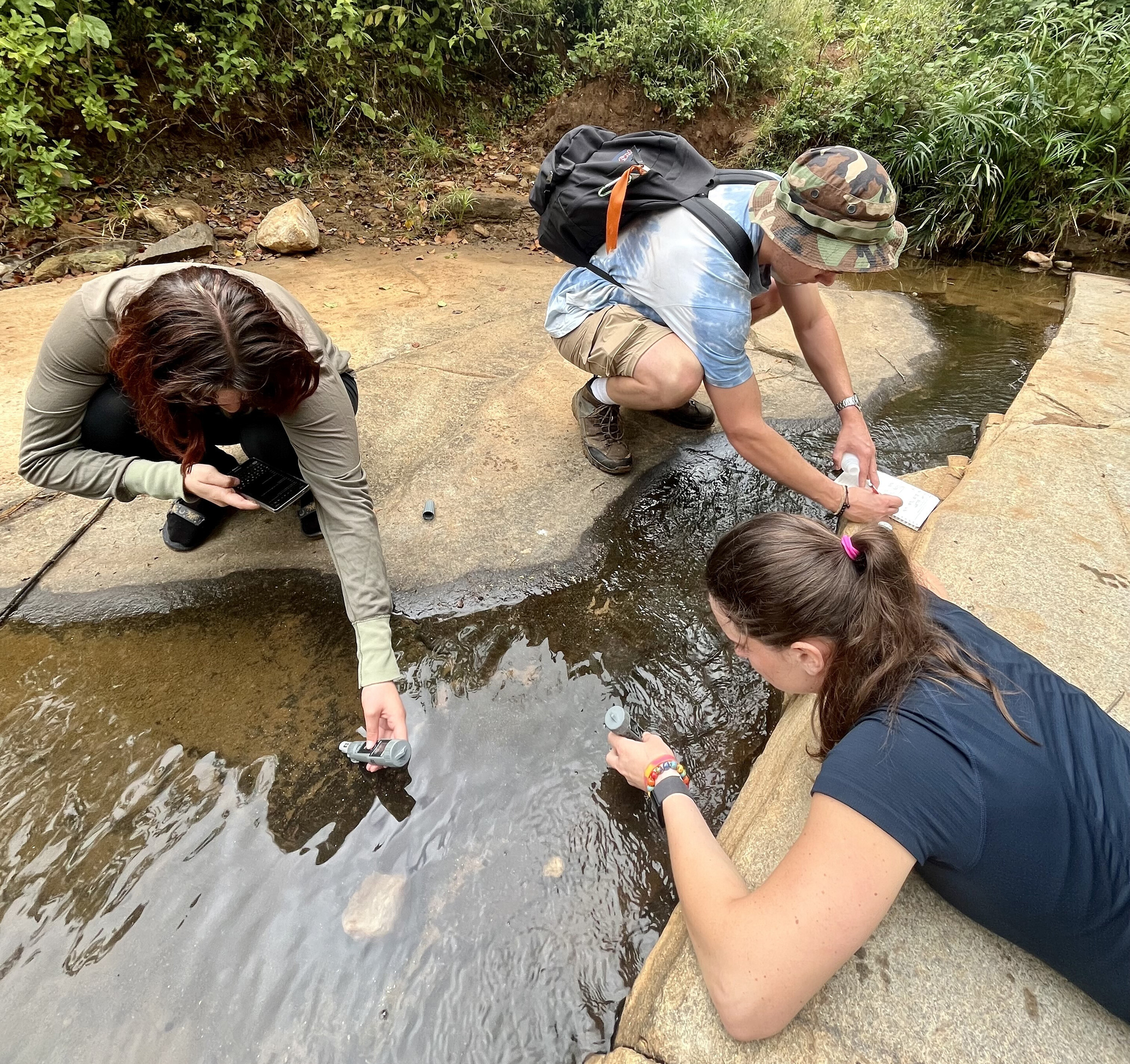
(From left) Doctoral student Hannah Yamagata, research assistant professor Kushol Gupta, and postdoctoral fellow Marshall Padilla holding 3D-printed models of nanoparticles.
(Image: Bella Ciervo)
3 min.

Fourth-year Griffin Pitt grew up hearing the expression “Water always wins” from her grandmother, an insurance agent. Pitt grew up in Charlotte, North Carolina, where coal ash ponds threatened local drinking water. Her family is from and has since returned to Tarboro, a rural town in the eastern part of the state that was deeply impacted by flooding from Hurricane Matthew in 2016.
“Seeing how flooding and industrial waste compounded existing inequities taught me that water challenges are never just technical; they are intertwined with history, justice, and community resilience,” Pitt says.
Her upbringing inspired her to major in environmental studies and urban studies in the College of Arts & Sciences at Penn. Her academic experience has provided her with hands-on opportunities to explore issues of water access—whether that’s flooding or drought—back home and abroad. “Penn has helped me in so many ways apply what I learn in the classroom outside of it,” she says.
Last year, she joined a Water Center at Penn project evaluating the impacts of water infrastructure investments in the Catawba-Wateree Watershed in North Carolina and South Carolina. She also twice attended the Catawba-Wateree Water Management Group’s Water for All Summit, an experience that built on her interest in dialogue as an undergraduate fellow in the SNF Paideia Program.
“The summit reinforced the importance of building coalitions that combine technical expertise with lived experience,” Pitt says, noting that she learned how water connects rural communities, urban utilities, and policymakers.
“I think the issue with water is that there is no boundary to it, and so transboundary issues naturally arise in whatever watershed you’re looking at,” Pitt says. She took an urban sustainability class with Water Center Director Howard Neukrug and a negotiations class in the Wharton School but says, “it’s another thing to go and apply your learning in the field.”
For her honors thesis, Pitt is returning to the town across the river from her family in Tarboro. She is interviewing teachers, students, and community members in Princeville—the first independently governed African American community in the United States—about the aftermath of Hurricane Matthew, to understand how flooding disrupts educational experiences. “I want to understand how repeated environmental shocks shape not only physical spaces but also learning, memory, and identity for students,” she says.
Pitt is also working on a second thesis focused on integrating traditional ecological knowledge into contemporary water management approaches. Over the past two summers, with funding from the SNF Paideia Program, she was also able to join a pair of research projects focused on traditional approaches: sand dams in Kenya and ancient canals called amunas in Peru.
While in Kenya the summer after her second year at Penn, Pitt spent five weeks visiting 25 sand dams, seasonal riverbeds in which accumulated sand acts as a sponge to conserve water during the wet season. Working with James Madison University professor Wayne Teel and other student researchers, she helped conduct water tests, measure dams, and interview older women in the communities about the positive impacts of the sand dams, such as keeping kids in school instead of requiring their help for water collection during the dry season. This data, Pitt says, will help the Utooni Development Organization with grant applications to build more sand dams.
Last spring, through the Penn IUR Undergraduate Urban Research Colloquium, Pitt worked with Weitzman School of Design Ph.D. candidate Hui Tian to help assess the efficacy of China’s Sponge City Program. The initiative utilizes nature-based solutions—such as culverts and trees—to improve urban stormwater management in 30 cities. Pitt contributed by conducting a literature review, analyzing case studies, using geospatial tools to analyze patterns across cities, and doing coding to process and interpret data. This experience, she says, taught her about computational methods and showed her how technical analysis can inform policy decisions.
Whether it’s through further education or consulting on water infrastructure for governments, water is in Pitt’s future plans. “We know with climate change that water issues are going to become more prevalent and common and serious and devastating, and how we choose to act with these issues is going to be ultimately what defines what our world is going to look like,” she says.

(From left) Doctoral student Hannah Yamagata, research assistant professor Kushol Gupta, and postdoctoral fellow Marshall Padilla holding 3D-printed models of nanoparticles.
(Image: Bella Ciervo)

Jin Liu, Penn’s newest economics faculty member, specializes in international trade.
nocred

nocred

nocred